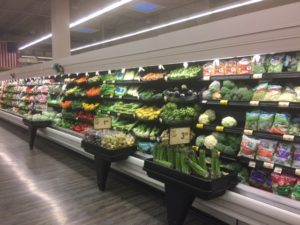
Three memorable lessons on hunger–two from communism and one from Africa–taught me to never waste food or take it for granted. I’m an American woman raised in and living in abundance. There are two well-stocked grocery stores within a mile of my house, and my pantry is full. What do I know about hunger? I’m learning, one humble moment at a time.
Hunger Lesson #1: Don’t Pay to Lose Weight.
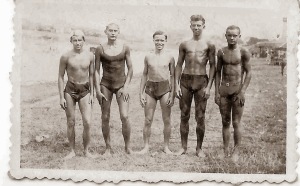
In one of my first interviews with Henry Zguda, I learned that growing up in 1930s Poland, dinner was usually the uncle’s sauerkraut, potatoes and occasional sausage. Breakfast might be a piece of bread, wet and sprinkled with a touch of sugar. One day we were talking, and he stopped to reflect. “Katrina. You know what I don’t understand about this country? [The United States.] There’s all kinds of ads on television for people to lose weight. Losing weight is so simple. Stop eating. Let me tell you, under communism people stood in line for hours just to get food. Why would anyone pay not to eat? That makes no sense at all.” He held his hands up and shrugged his shoulders in confusion as I thought of that inch I could pinch. I laughed at the obvious logic – but I left humbled.
Hunger Lesson #2: Chicken Feet are Valuable

A year later, when my son was about ten, we had a Halloween party for his friends. For one ‘game’ I hid odd food in different boxes, told a story about monsters missing their body parts, and led them into a dark room where they could only feel the food and find the ‘body parts.’ (OK, maybe you had to be there, and have a roomful of pre-adolescent boys with imaginations.) I had gone to the Asian market and bought food like eels and chicken feet that I knew they wouldn’t recognize. The boys had a blast and never guessed the chicken feet (but they sure felt like cold monster hands.) Shortly thereafter, I had new friends from Romania over for dinner. When I described the party, and mentioned the chicken feet, she didn’t smile. She stared at me, and very frankly said “under communism, we stood in line for hours just to get chicken feet.” Though polite, I could sense shock, and subtle disdain at the waste of buying food for a children’s game – just to throw it out. I quickly changed the subject, but I’ll never forget her words or the look on her face. Humbled again.
Hunger Lesson #3: Never. Leave. Food. Behind. Ever.
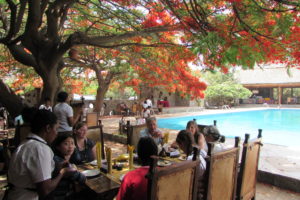
I visited Ethiopia in April as part of a sponsored group. More an experience than vacation, we visited child development centers and played with lots of kids in far humbler classrooms than my kids attended. Then we’d leave and eat lunch at a nice restaurant. Then our group returned for home visits to the humblest of homes, as if stepping onto a page in National Geographic. Then back to the resort for a nice dinner. The daily extremes got to me after a few days, because there was nothing in the middle.
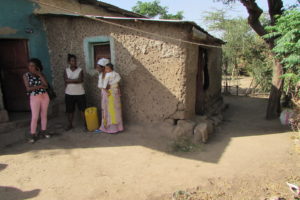
Each day, members in our group carefully packed each person’s uneaten food leftovers in takeout containers, down to the last piece of bread on the table. The containers were split between the four families we visited that day. On our last day in Addis Ababa, on the way to the airport, someone handed all our lunch leftovers to one of many crowds of street beggars, who then swarmed around it. Have I mentioned there’s a nationwide drought in Ethiopia for the second year in a row causing huge food shortages? There’s an estimated 5.7 million people at severe risk, and in the middle of a huge humanitarian crisis. Washington Post: Ethiopia is facing a Killer Drought
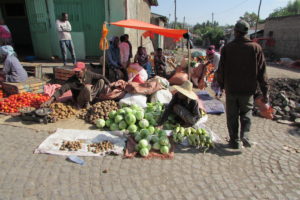
In my forthcoming book, there’s one scene about hunger in a concentration camp, and what it can do to people. I share these lessons as a reminder of the blessings we enjoy in this country, and as an exercise in both gratitude and empathy. And if I need to lose a few pounds? That means I have food in the first place.
Do you have a story about hunger? Did your family ever have more days in the month than food in the cabinet? And if so, how did it affect you?
Note – All of the children in Compassion receive food, nutritional supplements if needed, and other necessities. The families we visited were universally gracious and lovely, usually offering a traditional coffee ceremony reserved for very special visitors, including the single mom featured in the photo above. Food is always precious and not to be wasted, but I didn’t see the real hunger I know exists in a large portion of the country.

11 Comments. Leave new
What valuable lessons and reminders of how truly fortunate we are. Thank you for sharing these Katrina.
Katrina, Great story! I’m volunteering in a few weeks with the Andre House feeding the homeless. “Different Latitudes” deals a lot with hunger issues–especially with Food for the Hungry and World Neighbors–you’ll see all of this in my book One other group you might want to check out is Stop Hunger Now–one of my buds, Ray Buchanan” is a founder–they package dehydrated foods here and send them to crisis situations abroad http://www.stophungernow.org
Thanks Mark! It’s a good lead.
I agree with Henry Zguda and Katrine. It is so simple, do not overeat if you do not want to become fat; limit the intake of food. I was growing up on a farm during WWII so there was no shortage of food. However, some people living in cities, prisons or concentration camps were starving. I was lucky to live on a farm and have parents who shared their crops with those villagers who did not have enough food of their own.
While living of a farm we were not hungry but faced shortage of sugar, hair shampoo and soap so my mom learned how to make soap. Therefore, ompared to other children my shortages were not as important. Therefore, it is a simple lesson take as much food as you need to be nourished and share the access with others so you will not waste.
Thanks Lucyna!
As usual, you have such insightful articles. Thank you for these!
Thanks Linda!
I, too, grew up not knowing hunger. But, even with our abundance, Dad was very firm on not wasting food – saving even a few tablespoons of mashed rutabagas; and, swishing a teaspoon of his coffee into the ketchup bottle to get every bit off the sides of the bottle. Our parents struggled in my childhood years, Dad taking a cheese sandwich to work every day; yet, I have no memory of not having what I needed. Our parents lived through the Depression and Dad’s parents through tough times. I have always detested waste. Another lesson from Dad – thank you.
Katrina – Thank you for your insightful perspectives! Necessary for appreciation of our abundance.
Thanks for the great comment, Jean. I also remember being the last family on the block to get a color tv – because why replace a black-and-white set that still works? It’s still humbling to be reminded by others.
My father was so resourceful and very intelligent and could cope with any adversity. He grew up on a farm in Kansas where my grandparents were prepared for “anything.” They grew wheat, had cattle, grandmother had a garden….my grandparents built a “pond” stocked with fish that the children swam in in the summer. The farm was handed down from our Mennonite settler great grandparents who immigrated from the Kiev area of Russia. I often wondered, “Dad, how did you survive the Depression?” He was matter of fact and simply explained–we had anything we wanted on the farm and took the community needs downtown to our hometown, Hillsboro, KS to barter for those in need from goods from the farm. Dad always amazed me how smart and resourceful he was…valuable lessons from growing up on a farm!
What a fascinating background. I’ve noticed another common theme in your family’s story besides resourceful, is resiliency. That’s a wonderful legacy to inherit.